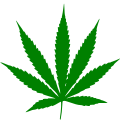Cannabis in Jamaica
Cannabis in Jamaica is illegal, but possession of small amounts was reduced to a petty offense in 2015. Cannabis is locally known as ganja, and internationally cannabis consumption play a prominent role in the nation's public image, being tied to cultural touchstones such as Rastafarianism and reggae music.[1]
History
Cannabis was introduced to Jamaica in the 1850s-1860s by indentured servants imported from India during British rule of both nations; many of the terms used in cannabis culture in Jamaica are based on Indian terms, including the term ganja.[2][3][4]
Prohibition
Cannabis was banned in Jamaica under the 1913 Ganja Law, supported by the white elites and the Council of Evangelical Churches in Jamaica[5] The laws were gradually tightened over time, with academics noting that the strict 1941 and 1961 restrictions occurred during periods where the authorities feared unrest in the lower classes.[6]
Commerce
While cannabis use had been customary in Jamaica for over a century, in the 1960s cannabis farmers began to take advantage of the growing demand in Europe and North America, leading to increased police enforcement, but also corruption of the security and political systems by the profits from international trafficking.[7]
Decriminalization
In February 2015, Jamaica's legislature voted to amend the nation's cannabis laws:[8]
- Possession of up to 2 ounces (56.6 grams) is a petty offence, and will not "result in a criminal record"
- Cultivation of five or fewer plants is permitted
- Practitioners of the Rastafari faith may use cannabis for religious purposes
- Tourists with a prescription for medical marijuana may apply for permits to purchase small amounts
- The amendments open the possibility of a licensing authority to deal with cultivation and distribution of medical marijuana
- Jamaica will continue to prosecute traffickers and target the international cannabis trade
See also
References
- ↑ Michael Veal (15 August 2013). Dub: Soundscapes and Shattered Songs in Jamaican Reggae. Wesleyan University Press. pp. 33–. ISBN 978-0-8195-7442-8.
- ↑ Micah Issitt; Carlyn Main (16 September 2014). Hidden Religion: The Greatest Mysteries and Symbols of the World’s Religious Beliefs. ABC-CLIO. pp. 123–. ISBN 978-1-61069-478-0.
- ↑ Martin A. Lee (14 August 2012). Smoke Signals: A Social History of Marijuana - Medical, Recreational and Scientific. Simon and Schuster. pp. 143–. ISBN 978-1-4391-0260-2.
- ↑ Anita Kalunta-Crumpton (25 January 2012). Race, Ethnicity, Crime and Criminal Justice in the Americas. Palgrave Macmillan. pp. 219–. ISBN 978-0-230-35805-8.
- ↑ "The ganja law of 1913: 100 years of oppressive injustice - Columns". JamaicaObserver.com. 2013-12-02. Retrieved 2015-07-24.
- ↑ Axel Klein; Marcus Day; Anthony Harriott (13 November 2004). Caribbean Drugs: From Criminalization to Harm Reduction. Zed Books. pp. 20–. ISBN 978-1-84277-499-1.
- ↑ Ansley Hamid (1 January 2002). The Ganja Complex: Rastafari and Marijuana. Lexington Books. pp. 79–. ISBN 978-0-7391-0360-9.
- ↑ Associated Press in Kingston. "Jamaica decriminalises marijuana | World news". The Guardian. Retrieved 2015-07-24.
Further reading
- The Pros and Cons of Cannabis Used in Jamaica (Working Paper for panel on Youth and Drugs, Costa Rica, January 8, 1971 ed.). U.W.I. 1971.
- Vera Rubin (1 January 1975). Cannabis and Culture. Walter de Gruyter. pp. 119–. ISBN 978-3-11-081206-0.
- Nathaniel Samuel Murrell (1 January 1998). Chanting Down Babylon: The Rastafari Reader. Temple University Press. pp. 131–. ISBN 978-1-56639-584-7.
- http://www.billboard.com/articles/business/6429591/marijuana-reggae-jamaica-legalize-marketing
- http://www.gorilla-cannabis-seeds.co.uk/blog/article/1839/the-jamaica-situation.html

